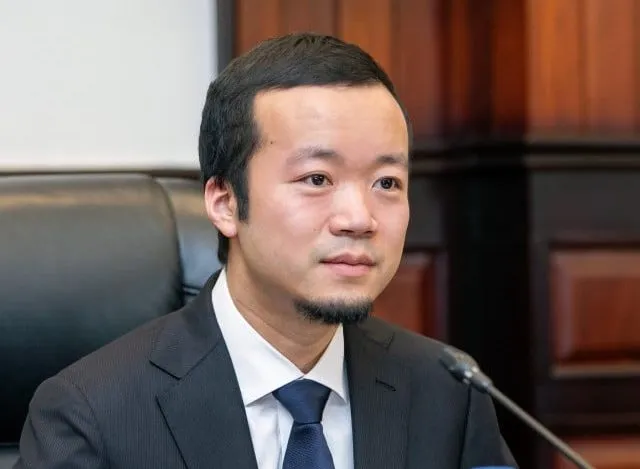New Delhi, Oct 24: The man at the centre of it, Chen Zhi, just 37, is accused by the US Department of Justice of masterminding a global cyber-fraud network that stole $14 billion in cryptocurrency. He has been charged with running “scam compounds” in Cambodia that trapped and tortured trafficked workers (God knows how many Indians) while defrauding victims across continents. The US Treasury calls it the largest cryptocurrency seizure in history, $14 billion in Bitcoin linked to Chen’s empire.
Head, who investigated Chen’s rise in a detailed BBC feature, described him as “the mysterious owner of a scam empire built on human suffering.” Behind that empire was a man who looked more like a student than a tycoon, a baby-faced figure with a wispy goatee and a quiet voice. Yet, in less than a decade, Chen Zhi rose from obscurity in China’s Fujian province to become one of the most powerful businessmen in Cambodia, with citizenships and assets spread across Asia, Europe, and the Pacific.
From Fujian to Phnom Penh
Chen’s story begins in the coastal province of Fujian, where he ran a small online gaming firm that barely made headlines. Around 2011, he left China for Cambodia, a country undergoing a real estate boom fuelled by Chinese capital and the Belt and Road Initiative. By 2014, Chen had become a Cambodian citizen, paying at least $250,000 for the privilege. The new passport opened the floodgates. Within a year, he founded the Prince Group, a conglomerate that would soon dominate the Cambodian skyline. His luxury developments transformed Phnom Penh and Sihanoukville into glittering cities of glass and steel.
Casinos, hotels, apartment blocks, and shopping malls rose overnight. In 2018, he launched Prince Bank, acquired a Cypriot passport (for $2.5 million), and later secured Vanuatu citizenship. His holdings stretched from Southeast Asia to London, New York, and Singapore. He even launched Cambodia’s third airline and began plans for a $16 billion “eco-city” called Bay of Lights on the southern coast.
Local media hailed him as a “philanthropist,” a man who funded scholarships and Covid-19 relief. In 2020, Cambodia’s king awarded him the title Neak Oknha, the nation’s highest civilian honour. Few asked how a 30-something outsider had achieved all this so fast.
Behind the Curtain
According to the BBC investigation, the answer lies in an empire built on fraud and fear. The US and UK governments allege that Chen’s conglomerate, the Prince Group, served as a facade for a sprawling network of online scam compounds operating across Cambodia, Thailand, and Vietnam. Thousands of trafficked workers, from China, Malaysia, and other Asian countries were forced to work inside heavily guarded buildings like Golden Fortune Science and Technology Park, a compound built by Chen’s group near the Vietnamese border.
Witnesses interviewed by BBC and Radio Free Asia described beatings, torture, and enslavement of workers who refused to participate in the scams. Victims were coerced into luring targets into fake crypto and investment schemes, generating billions in illicit profits. The US Treasury described Chen’s syndicate as profiting from “a litany of transnational crimes”, sextortion, money laundering, illegal gambling, and “industrial-scale trafficking and torture.”
Yet, Chen kept expanding. Even after Cambodia banned online gambling in 2019 under pressure from China, he continued buying property and launching ventures. According to UK authorities, Chen purchased a £12 million mansion in north London and a £95 million office block in the City. The US says he and his associates bought Picasso paintings, superyachts, and private jets, all with stolen money aasa reported by BBC.
The illusion began to crumble in 2019 when Cambodia’s property bubble burst. Online gambling was outlawed, and half a million Chinese investors fled Sihanoukville. Yet, Chen’s companies stayed afloat, even thriving — raising more suspicion. By 2020, investigators in China, the US, and the UK were tracking his network. The US and UK have now sanctioned 128 companies and 17 individuals linked to Chen’s empire across seven countries, freezing assets and cryptocurrency wallets.
The BBC feature notes how Chen’s operations expanded quietly across borders, aided by complacent bankers, lawyers, and real estate agents who never asked where his fortune came from. “What should make people uncomfortable,” journalist Jack Adamovic Davies, who spent three years investigating Chen, told the BBC, “is that he was able to acquire all these assets — in London, Singapore, New York — without anyone raising an alarm. It just didn’t add up.”
Vanished Without a Trace
Now, as his empire collapses, Chen Zhi himself has vanished. Since the US and UK sanctions were announced, not a single public appearance or statement has been made. His bank, Prince Bank, is facing anxious withdrawals; South Korea has frozen $64 million of deposits linked to his firms; Singapore and Thailand have launched investigations. The Cambodian government, once closely aligned with Chen, has offered only muted responses, urging foreign authorities to ensure their evidence is solid. But the silence is telling. The man who once stood beside Cambodia’s most powerful politicians has become a ghost — his whereabouts unknown, his empire in ruins, and his name now synonymous with one of the biggest cybercrime scandals in history.
As Southeast Asia Correspondent Jonathan Head wrote in the BBC’s report: “It is shocking that Chen Zhi’s empire could grow so vast, cross so many borders, and cause so much suffering, before anyone dared to stop it.” From Fujian’s dusty streets to Phnom Penh’s shimmering skyline, Chen Zhi’s story is a parable of unchecked greed in the digital age, a tale of ambition, corruption, and vanishing fortunes. And somewhere out there, the phantom tycoon is still free.








